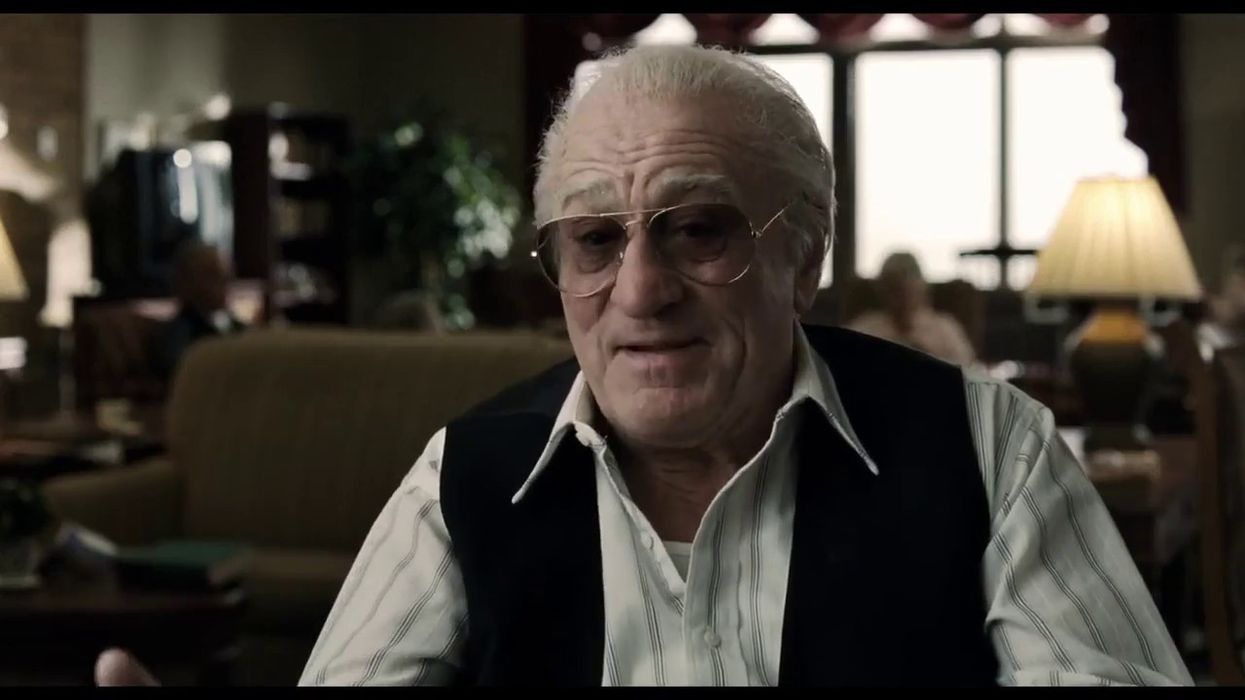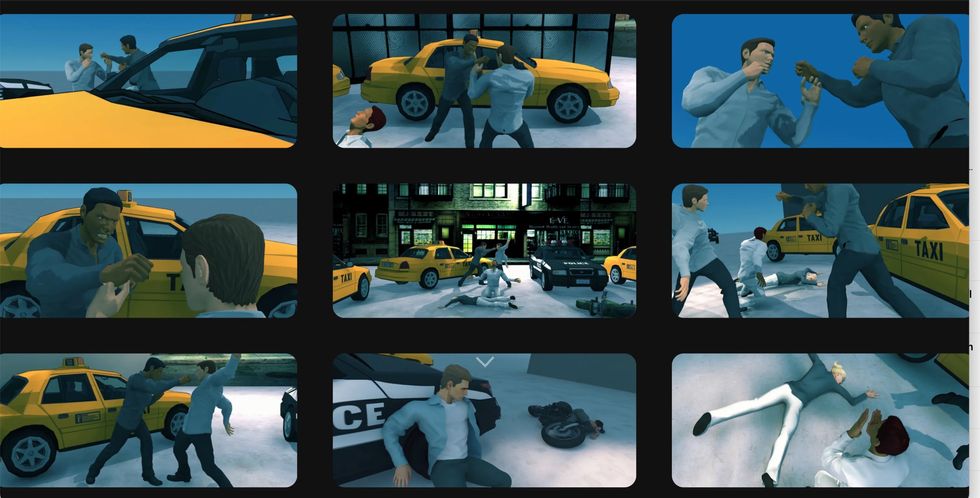Is the Lead Character in 'The Irishman' a Sociopath?
The Irishman is racking up many awards. But is its central character a sociopath?

Martin Scorsese loves movies about gangsters. I know that's probably obvious, but it always seemed like even as he gets older, his gangsters stay the same. They were the constants in my life, and I loved them.
But then Scorsese came in with The Irishman.
Instead of showing us an overly emotional guy, obsessed with money, and interested in sex...we have a guy who holds it all inside.
A guy who treats killing like any blue-collar job, like painting houses.
This guy...well...he might be a sociopath, and that's some uncharted territory for Scorsese.
Today, I want to dig into Frank Sheeran's character and talk about how he represents a change in the winds for a Scorsese gangster.
Check out this video from The Discarded Image, and then let's talk after the jump!
[Editor's Note: Potential spoilers for the ending of The Irishman will follow.]
Is the Lead Character in The Irishman a Sociopath?
As I mentioned in the opener, Martin Scorsese has become synonymous with the gangster genre. Characters like Henry Hill, Jordan Belfort, and pretty much everyone in Casino all glorify and embrace the lifestyle of these miscreants.
They get rich, they take pride in their actions, and they wear their hearts on their sleeves.
Henry Hill buys his mistress a house.
Jordan Belfort refuses to resign, even when he knows it will be his downfall.
And Sam "Ace" Rothstein liked smashing the hands of people who count cards.
Still, even though these people all take delight in various things, they also feel and show great pain. Some are executed, some lose everything, and others are forced to disappear into witness protection.
They're social creatures who enjoy other people and life. They are bad, but they acknowledge they're bad in a world full of bad. They have excuses why what they did was good, and why you should be on their side.
But when it comes to Frank Sheeran, things are different.
What's a sociopath, anyway?
Before we get into Frank Sheeran, I want to define what he's been accused of being...a sociopath.
According to the dictionary, a sociopath is "a person with a personality disorder manifesting itself in extreme antisocial attitudes and behavior and a lack of conscience."
Does that sound like Frank?
Yes. It does.
Frank works methodically. He uses different guns but drops them off the same bridge. He refers to killings as "painting houses," which sets a particular detachment apart. This detachment doesn't just shift to work, but his home as well.
The most emotion Frank shows toward his kids is when he can enact violence on a man who hurt his daughter for breaking something in his store.
Franks associates show more love and affection for his kids than you ever see him show.
And at the end of his life, he's never quite sure why they don't embrace him back.
So, Frank does show the vital signs of being a sociopath.
But chances are he's not.
The Internal Struggle of Frank Sheeran
Without delving too much into cliches, you can infer that a movie about a person of Irish heritage might be focused more on the character's internal struggle. We often see people from this generation not rewarded for outward emotion.
And Frank certainly fits that bill.
He doesn't sweat when he puts his life on the line, and he doesn't flinch when he pulls the trigger.
The only time we see real emotion from Frank is when he's hugging Hoffa right before he knows he's going to execute him.
That's why I don't think Frank is actually a sociopath. As the video shows us, Frank practices love with calculations.
Love and Frank
Early in the movie, when a prettier woman who's a favorite of his friends presents herself, Frank leaves his current wife and shacks up with her. It's a calculated move to better the life he had and his position in the world.
Later, as he rises in the union, Frank goes to love two people: Russ and Jimmy Hoffa. This fraternal love works, but he's also aware loving these men allows him to gain a lot of income and betters his life...
Are you sensing a theme here?
When Russ asks Frank to kill Hoffa, he must again calculate who he loves.
By going with Russ, Frank ensured he would have a long life. What he didn't calculate was how it would affect the people around him.
Frank and his daughters
When Hoffa is said to be missing, and Frank confesses he hasn't called about him, it does exhibit something of sociopathic nature. But for me, it seems more like he's a guy coming to terms with some mental math.
He doesn't know how to deal with what he's calculated.
Much like Frank planning a trip at the beginning of the movie, he's a think. He is trying to pick the best and easiest route in life.
But that didn't work with his kids.
They observed him tuck a gun into his pants and go to work. They came to terms with who he was growing up. But not Peggy. Peggy is Frank's moral center. And I think if he knew that what he did as his day job would be the reason she stopped talking to him, he might have ended.
Well, maybe not, but he might have talked to her sooner.
Peggy's silence is strategic. It goes a long way into showing what Frank thinks of his kid and her ideas.
And honestly, it probably shifts him back toward the sociopath profile.
But what about Frank's religion?
God and Frank
Frank is Irish...which means he's Irish Catholic. Toward the end of his life, as he sees other gangsters going toward the grave, Frank starts to think a lot about hell. See, he's functioned as the angel of death for most of his life.
Now he senses that the angel might be coming for him.
So Frank makes other calculations and begins to speak with a priest.
It's hard for us to tell if this is Frank truly feeling remorse at the end of his life...or calculating that if he gets absolution and forgiven for all his sins, he can sneak into heaven. A chance at a moral loophole that was not afforded to the people he killed.
Still, you'd think Frank wouldn't try to outsmart God...but maybe he would.
Frank's last days are spent trying to obtain forgiveness from a higher power, his children, and maybe from himself?
The only proof we have that he's not truly a sociopath, beside the hug with Hoffa, are these scenes.
But it's up to you to decide if Frank is showing real remorse, or actually showing the same calculated love for himself that he's shown the entire film. He picks out a grave, a coffin, and his personal effects like he's at the grocery store buying food.
So maybe it's safe to say Frank has not changed at all.
He just has been going through the motions he has his entire life...a blue-collar worker taking pride in the day-to-day.
The only evidence left is what Frank does with his door at the end of the film.
He leaves it open. Open for death to come in and quietly take him, and open because as he looks back the best days of his life were spent with Hoffa, whom he loves and misses. That love disqualifies him from being a sociopath.
But only if you think he truly feels it.
What's next? Read and Download The Irishman Script!
If you read and download The Irishman script, you can learn a ton of lessons about pacing, structure, and narrative storytelling.
Click for more.






















